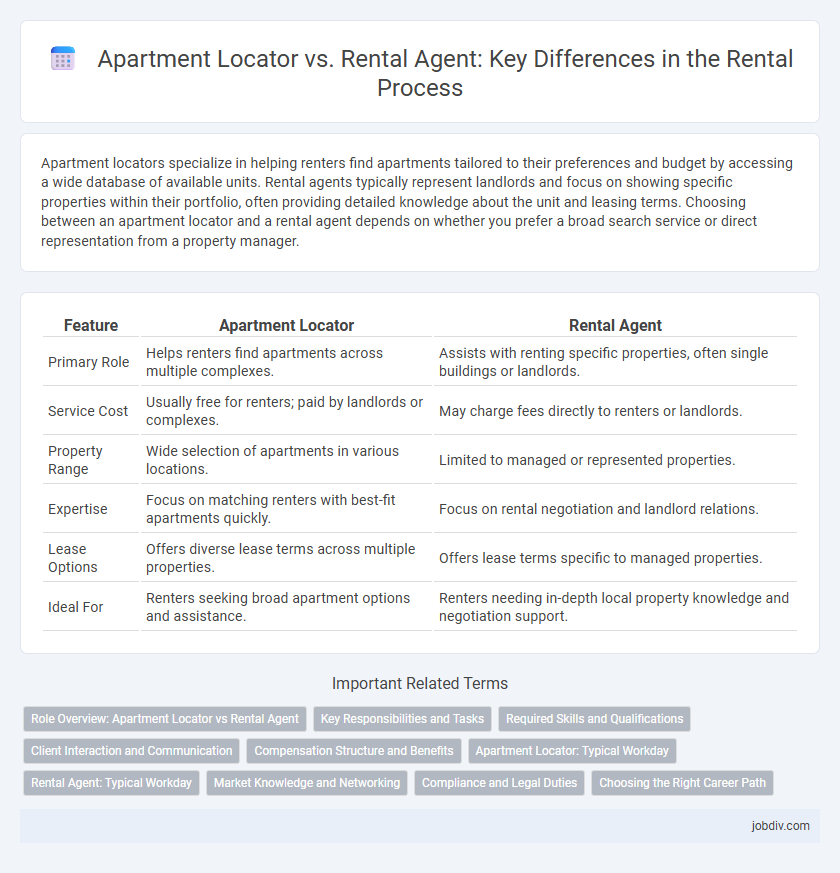Apartment locators specialize in helping renters find apartments tailored to their preferences and budget by accessing a wide database of available units. Rental agents typically represent landlords and focus on showing specific properties within their portfolio, often providing detailed knowledge about the unit and leasing terms. Choosing between an apartment locator and a rental agent depends on whether you prefer a broad search service or direct representation from a property manager.
Table of Comparison
| Feature | Apartment Locator | Rental Agent |
|---|---|---|
| Primary Role | Helps renters find apartments across multiple complexes. | Assists with renting specific properties, often single buildings or landlords. |
| Service Cost | Usually free for renters; paid by landlords or complexes. | May charge fees directly to renters or landlords. |
| Property Range | Wide selection of apartments in various locations. | Limited to managed or represented properties. |
| Expertise | Focus on matching renters with best-fit apartments quickly. | Focus on rental negotiation and landlord relations. |
| Lease Options | Offers diverse lease terms across multiple properties. | Offers lease terms specific to managed properties. |
| Ideal For | Renters seeking broad apartment options and assistance. | Renters needing in-depth local property knowledge and negotiation support. |
Role Overview: Apartment Locator vs Rental Agent
An apartment locator specializes in helping clients find suitable rental properties by leveraging extensive market knowledge and access to exclusive listings, streamlining the search process. A rental agent works directly with landlords or property managers to market rental units, handle tenant screenings, and manage lease agreements, ensuring efficient property occupancy. Both professionals facilitate connections between renters and landlords but differ primarily in client focus and scope of responsibilities.
Key Responsibilities and Tasks
Apartment locators specialize in finding available rental units based on clients' preferences, utilizing extensive property databases to match needs such as budget, location, and amenities. Rental agents handle lease negotiations, property showings, and assist with rental applications, ensuring smooth communication between landlords and tenants. Apartment locators primarily focus on the client search process, while rental agents manage ongoing rental transactions and landlord relations.
Required Skills and Qualifications
Apartment locators require in-depth knowledge of local rental markets and strong networking skills to match clients with suitable properties quickly. Rental agents must possess excellent negotiation abilities and a comprehensive understanding of lease agreements, tenant rights, and property management regulations. Both roles benefit from effective communication skills and familiarity with real estate software to efficiently streamline the rental process.
Client Interaction and Communication
Apartment locators specialize in matching clients with available rental properties based on personalized preferences, maintaining frequent communication through calls, emails, or messaging to streamline the search process. Rental agents typically manage direct interactions with landlords and tenants, coordinating property viewings and negotiating lease terms while providing timely updates to clients. Both roles emphasize clear, responsive communication to ensure client needs are thoroughly understood and efficiently addressed.
Compensation Structure and Benefits
Apartment locators typically earn a commission paid by property owners or landlords, usually a percentage of the lease value, while rental agents often receive a salary supplemented by bonuses or commissions based on tenant placement. Apartment locators benefit from flexible schedules and the opportunity to work with multiple properties across various locations, enhancing their market reach. Rental agents gain access to in-house resources and client leads, providing stability and consistent income along with potential benefits like health insurance and retirement plans.
Apartment Locator: Typical Workday
An Apartment Locator typically starts their workday by analyzing client preferences such as budget, location, and amenities to narrow down suitable listings. They contact landlords and property managers to confirm availability and negotiate favorable lease terms on behalf of renters. Their goal is to streamline the apartment hunting process by providing personalized options and arranging property tours efficiently.
Rental Agent: Typical Workday
A rental agent's typical workday includes coordinating property showings, screening potential tenants, and processing lease agreements to ensure smooth transactions. They maintain communication with landlords and renters, handle maintenance requests, and update rental listings to match market demands. Efficient time management and strong interpersonal skills are essential for rental agents to balance multiple client needs effectively.
Market Knowledge and Networking
An apartment locator leverages extensive market knowledge and a broad network to connect renters with suitable listings quickly, often specializing in multiple neighborhoods and property types. Rental agents typically possess in-depth local expertise and direct relationships with landlords, enabling them to negotiate favorable lease terms and access exclusive listings. Both professionals use their networks strategically, but apartment locators focus on efficiency and variety, while rental agents concentrate on personalized service and detailed market insights.
Compliance and Legal Duties
Apartment locators primarily act as intermediaries between renters and landlords, ensuring adherence to fair housing laws and local rental regulations. Rental agents, licensed real estate professionals, bear comprehensive legal responsibilities including contract enforcement, tenant screening, and disclosure obligations to comply with state and federal laws. Both roles require strict compliance with anti-discrimination statutes, but rental agents face heightened liability due to their broader fiduciary duties and regulatory oversight.
Choosing the Right Career Path
Choosing between an apartment locator and a rental agent career involves understanding the key differences in job responsibilities and client interactions. Apartment locators typically work independently, connecting renters with available properties across multiple landlords, while rental agents often operate within a specific property management company, focusing on leasing units within their portfolio. Evaluating career goals, desired work environment, and commission structures helps determine the optimal path for a successful rental industry career.
Apartment Locator vs Rental Agent Infographic

 jobdiv.com
jobdiv.com